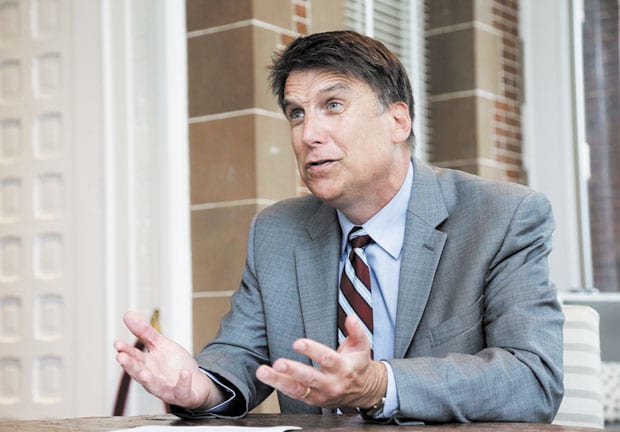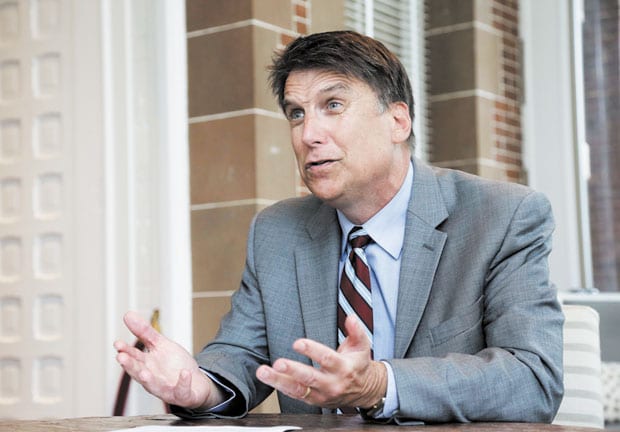LGBT rights battles now playing out in statehouses got their start in Texas
JAMES RUSSELL | Staff Writer
After calling an emergency one-day session of the North Carolina Legislature in March to address the city of Charlotte’s nondiscrimination ordinance, Republican Gov. Pat McCrory signed House Bill 2, the Public Facilities Privacy and Security Act, into law.
The law overrides local nondiscrimination ordinances and forces transgender people to use bathrooms according to the gender designation on their birth certificates, not their actual gender identity.
McCrory has called HB2 common sense. Charlotte’s ordinance, in his words, was not common sense: “Ordinance defied common sense, allowing men to use women’s bathroom/locker room for instance,” he tweeted.
But on Tuesday, April 12, after loud national outcry, McCrory begrudgingly signed an executive order adding protections for LGBT employees and allowing businesses and local governments the right to establish nondiscrimination employment policies for their employees.
Lambda Legal Staff Attorney Kyle Palazzolo said this week that his organization will be going ahead with plans to sue the state over the discriminatory bill. The executive order, Palazzolo and others have said, was mere lip service without any real substance.
While LGBT groups and allies denounced the law, another group also spoke out against it: More than 130 business leaders from across the country signed a letter to McCrory in opposition to the law. They warned the law would “diminish the state’s draw as a destination for tourism, new businesses and economic activity.”
According to a report released by the Center for American Progress, a progressive think tank based in Washington, D.C., the North Carolina economy could lose out on more than $567.5 million in private-sector economic activity through 2018 because businesses don’t want to do business in a state with discriminatory laws in place.
North Carolina is already feeling the impact. After McCrory signed HB 2, the online payment system PayPal canceled plans to expand its Charlotte operation, a move that cost the state about 400 jobs. The German financial corporation Deutsche Bank announced plans to freeze any further expansion in the state — a loss of another 200 jobs.
Musicians Bruce Springsteen and Ringo Starr canceled performances in North Carolina, and the National Basketball Association has also threatened to pull its 2017 All Star games from the state.
Mississippi’s Republican Gov. Phil Bryant, failing to learn from North Carolina’s situation, recently signed similar anti-LGBT legislation into law. Other bills are currently under consideration in Massachusetts, Missouri, Michigan and Tennessee.
But North Carolina’s law is sweeping and more draconian.
Daniel Williams, legislative coordinator for Equality Texas, is all too familiar with these bills. He’s seen them all — or something like them — already.
“Every one of the bills you’re seeing in state legislatures is a version of bills we beat [in the last legislative session in Texas],” Williams said. “Opponents of equality in Texas have tried their bills here before elsewhere. What’s going on is predictive, a window into the future.”
But measures like in North Carolina, Williams said, “isn’t the stuff keeping me up late at night.”
What keeps Williams up late at night are the so-called targeted approaches — the narrow exemptions giving cover for religious individuals and faith-based organizations to decline service to individuals based on their beliefs.
Examples of the targeted approach include Collin County Republican Rep. Scott Sanford’s child welfare bil.
“Those bills allow child welfare organizations to discriminate against LGBT families based on religious beliefs. It’ll likely get a senate companion this time. Most of the bills will allow for religious override protections,” Williams said. “You’ll [also] see bills filed to allow county clerks to abolish issuance of same-sex marriage licenses based on religious convictions.”
Last year, Texas’ Attorney General Ken Paxton sent a letter to Lt. Gov. Dan Patrick outlining ways to protect a conservative form of religious liberty ahead of 85th legislative session. Chairman Joan Huffman, R-Houston, and Sen. Craig Estes, R-Wichita Falls, then addressed those concerns at the February hearing of the Senate’s state affairs committee. Estes most notably filed legislation last session that would have reasserted a clergy member’s right to refuse to perform a marriage that is against their religious beliefs.
“The big overarching stuff has been filed, but these targeted approaches are more dangerous. They are harder to explain they are dangerous,” Williams said.
Not only is the legislation familiar to Williams, but the business response to them is familiar too. “Nondiscrimination ordinances are good for businesses. The business community in Texas has shown they unequivocally oppose any broad discriminatory law,” he said.
Chris Wallace, president of the Texas Association of Business, a business trade organization with heavy influence in state politics, agreed. As LGBT rights become mainstream, Wallace said, the business community is realizing that discrimination hinders economic growth and drives away potential employers.
“Maybe it’s not good politics [to oppose this legislation] but it’s good policy. Texas is open for business for everyone,” Wallace said. “We’re usually ranked one, two or three [among] the best places to do business. Texas outshines its competitors. Discussions like these are detrimental [to the business climate].”
The millenial generation entering the workforce also does not want to work somewhere not welcoming to everyone.
“It’s a talent and workforce issue. [Studies show] straight millenials do not want to work somewhere that does not welcome all people,” Wallace said.
Wallace’s organization, which was recently honored by the North Texas GLBT Chamber of Commerce, came out in full force alongside Equality Texas and the American Civil Liberties Union of Texas, against a resolution filed by Republicans Rep. Jason Villalba of Dallas and Sen. Donna Campbell of New Braunfels that would have enshrined the state’s existing religious liberty bill in the Texas Constitution.
The ballot referendum would have allowed business owners to deny services and goods to LGBT people and others based on the business owners’ “sincerely-held” religious beliefs.
While Villalba dropped the proposal after hearing concerns from TAB leadership and others, Rep. Matt Krause, a Fort Worth Republican, filed his own bill. Campbell rebuffed the criticism and defended her bill.
Krause recently told the Austin American-Statesman he plans to file the legislation next session.
According to recent surveys, 67 percent of Texans support a law protecting LGBT people against discrimination in jobs, public accommodations and housing. And 53 percent oppose letting a small business owner, based on their religious beliefs, to refuse service to LGBT people.
It is clear, Williams said, “these laws don’t reflect Texas values and that is why they were defeated last cycle.”
But that doesn’t necessarily mean they’d be defeated next time around. “The question,” Williams said, “is if people and businesses are going to speak up and say these bills don’t reflect our values.”
This article appeared in the Dallas Voice print edition April 15, 2016.



